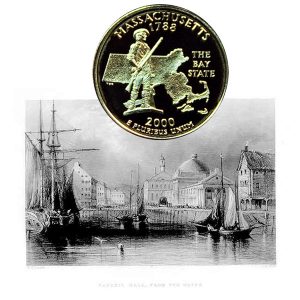Today, the Massachusetts State Quarter Coin remembers when the colonists held their own meeting beginning on September 22, 1768 to discuss their disagreement with British rule.
From The Birth of the Republic by Daniel Reaves Goodloe, published in 1889:
=====
The committee narrate at some length the circumstances attending the seizure by the Collector and Comptroller of the Customs, of the sloop Liberty, the property of John Hancock, of Boston. This happened on the 9th of May, 1768.
It “occasioned a most violent tumult; the Collector and Comptroller, with the son of the Collector, were attacked by a numerous and outrageous mob, who beat and abused them in a most cruel manner; and in the night attacked their houses, broke the windows, seized on a boat belonging to the Collector, which they carried away in triumph, and afterwards burnt.
“The commissioners of the customs, expecting the same treatment, the riot still continuing, thought it prudent to retreat for safety till midnight with their families to the houses of some persons in the neighborhood; and afterwards, upon conviction that their lives were in danger, took refuge on board his Majesty’s ship the Romney, then in the harbor of Boston, and for their further security, from thence into Castle William.”
The commissioners, from their retreat in the castle, applied several times to the Governor, Sir Francis Bernard, for protection. But the tone of his reply shows entire helplessness on his part, as well as a degree of timid acquiescence in what was deemed inevitable.
At length, on the 22d of July, he referred the letter to the Council, which body fully resolved ‘That the disorders which happened were occasioned by the violent and unprecedented manner in which the sloop Liberty had been seized by the officers of the customs.’
Two regiments were sent to Boston in consequence of these events, to support the civil power and preserve the peace; but this proceeding was the source of new disorders. The troops were cautioned against quarrelling with the townspeople, ‘by whom they complained they had been frequently ill-treated and insulted.’
Nevertheless, violent collisions occurred between the troops and the citizens, which caused the latter to be fired upon, and several were killed.
At a town meeting, on the 12th September, 1768, the freeholders and inhabitants of Boston declared, by resolution, that the taxation of the Colony by the British Parliament was a violation of the charter and of natural right.
They also resolved, as the Governor refused to call the Assembly together, that a committee of their number should be elected to meet committees from the other towns of the Province, in convention, “in order that such measures might be consulted and advised as his Majesty’s service, and the peace and safety of his subjects in the Province, might require.”
They also voted that “every listed soldier” “shall always be provided with a well-fixed. fire-lock musket, accoutrement, and ammunition.” This was based on the apprehension of a war with France.
The select-men, by instruction of this town meeting, addressed a long circular-letter to the other towns, in which their common grievances were set forth, and in which they were called on to send delegates, or, as they are called, committees, to meet in a Provincial convention for the purpose of devising measures of redress.
The proposed convention was to assemble on the 22d of September.
At this point I leave the report of the committee for a while, in order to refer to the proceedings of this convention.
It met in Faneuil Hall, according to Barry, at the appointed time, September 22d, 1768. He says:
“The convention called by the people of Boston met according to appointment; and, on the first day, about seventy persons appeared, the representatives of sixty-six towns. This number was increased by daily arrivals, until ninety- six towns and eight districts, nearly every settlement in the Province, was represented. Otis was at first absent; and Thomas Cushing, the speaker of the House, was chosen moderator, and the clerk of the House was chosen clerk of the convention.”
“They have committed treason,” shouted the officers of the Crown. “At least the select-men of Boston have done so.”
“Boston,” wrote Gage, ” is mutinous; its resolves are treasonable and desperate,” etc.
The convention petitioned the Governor to “cause an Assembly to be immediately convened.”
This he declined to do, on the ground that it would be an admission of the legality of the body. He advised the members to separate at once, and, if they failed to do so, he would assert the prerogative of the Crown, and those who persisted in usurping its rights, would be made to “repent their rashness.”
“But,” says the historian, “the message was received with derision.”
The convention continued in session six days, and repeated the protest of the people against the taxation of the Colonies by Parliament against a standing army, and against the danger to the “liberties of America, from a united body of pensioners and soldiers;” and, after renewing their petition to the King, which their agent was enjoined to deliver in person, as soon as possible, they dissolved.
“Some feared, others hoped, for much more serious consequences from this extraordinary assembly.”
But its members, aware of the necessity of prudence, displayed in all their proceedings remarkable caution, and when the result of their labors was transmitted to England, though many would gladly have seized upon the slightest flaw to justify their exemplary punishment, “no traces of high treason could be found in what had been done.”
The Boston town meeting, and the convention which it called into being, caused great indignation among the governing party in England.
=====
The Massachusetts State Quarter Coin shows with an artist’s view of Faneuil Hall from the harbor, circa early 1800s.
